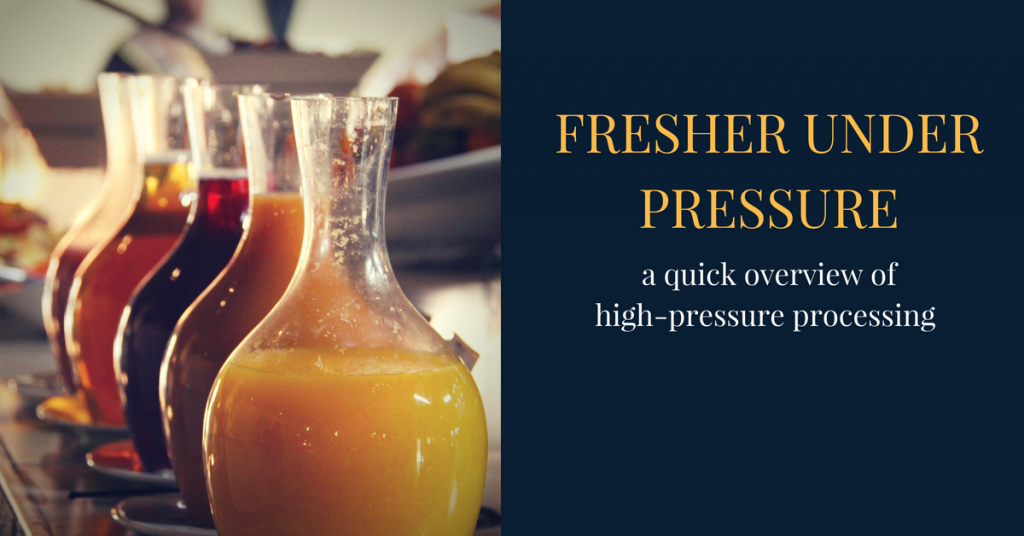The food industry is innovating at top speed to meet the changing demand and tastes of consumers. New products, processes and technologies are being introduced on a daily basis. One of these inventions is ‘High Pressure Processing (HPP)’, which helps products last longer and improves food safety. If you’ve been to the supermarket of late, you might have noticed various ‘cold-pressed’ juices, smoothies and soups, which have been taking up considerable shelf space of late. The technology used in these beverages is HPP, which is increasingly being used across a variety of products.
What is High Pressure Processing (HPP)?
HPP is a pasteurization technology that enables shelf life extension of products by applying pressure to inactivate microorganisms (yeasts, mold and bacteria) vs. conventional thermal or heat based processing. This yields foods and beverages closer to its ‘fresh’ or ‘unprocessed’ counterpart. Typical operating pressures range between 400MPa – 600MPa (58,000 – 87,000psi) for a hold time of 2-10 minutes depending on product application.
How does it work?
HPP affects permeability of microorganism’s plasma membrane and the disruption is like the bursting of a balloon. When the damage is beyond repair it leads to loss of functionality and ultimately cell death. Microorganisms have different degrees of resistance against HPP due to differences in chemical composition and structure of their cell membrane. Gram Positive bacteria are more pressure resistant than gram negative bacteria based on fluidity of its membrane. Food matrix, pH and temperature also impact microbial inactivation along with processing parameters like pressure applied and hold time.
What are the product requirements to use HPP for shelf life extension?
- pH: Research and commercial applications have validated use of HPP for shelf life extension of products under pH 5.0.
- Storage and distribution temperature: HPP is currently validated for refrigerated products only with ongoing research for shelf stable application.
- Water activity: The Aw of product must be above 0.90 as water is required to dissipate the pressure and enable microbial inactivation.
What products commercially use HPP today?
Currently this technology is most widely used for fruit and vegetable juices, soups & purees, RTE meats (deli meats), seafood (HPP can enable easy shucking of oysters and other crustaceans) and dips (salsa, hummus, guacamole). To a lesser extent HPP is being used in shelf life extension of salad dressings, fresh sides, ready to eat meals, cut fruits, pet foods and raw meats.
What are its advantages?
- Food Safety: HPP inactivates vegetative pathogens (e.g. Listeria monocytogenes, Salmonella, Escherichia coli ) and spoilage microorganisms (e.g. Lactobacillus , Bacillus). It can provide the 5-log pathogen reduction required for refrigerated products but does not inactivate spores (e.g. spores of Clostridium botulinum).
- Better sensory attributes: The colors, textures and aromas of food and beverages are better preserved through pressure vs. heat based processing.
- Better nutritional composition: Several nutrients are heat sensitive and undergo degradation with conventional thermal processing techniques. HPP enables preservation of these heat sensitive nutrients enhancing the functionality of products.
- Clean Label: The ability of this technology to preserve products and increase shelf life negates the need for preservatives (natural or chemical).
- Versatile use of Equipment: The processing equipment required is independent of the sample volume and type of product as water present in these products enables pressure to be exerted uniformly regardless of product geometry so the same HPP machine can be used for different types of products.
What are its limitations?
- Cost and Efficiency: HPP is limited to batch processing or a semi-continuous operation that requires manual aid to load and unload products thereby increasing costs and reducing efficiency.
- Type of Packaging: HPP packaging is restricted to flexible and semi-rigid packaging as compressibility is required for pressure to be applied to the product and for the package to maintain its form post processing.
- Types of Products: HPP cannot be applied to dry products, highly aerated products, high pH products and shelf stable products.
HPP is currently being widely applied in the food industry for the various benefits it offers. One of the common problems brands face while taking their HPP products to market is getting the labelling right. There has been much debate about the correct labelling of HPP products in the past, especially regarding the use of the words ‘raw’ and ‘fresh‘ in cold-pressed juices and smoothies. Suja LLC was involved in a lawsuit a few years ago for using the word ‘raw’ in their juices. Food startups are increasingly consulting food scientists for help with labelling and getting their products on the shelves.
Some brands currently using HPP to make juices/smoothies are Plenish Cleanse (UK), Naked Juice (owned by PepsiCo) and Evolution Fresh (Starbucks). In 2017, a TechNavio report predicted that the “global cold pressed juices market will grow steadily during the next four years and post a CAGR of over 8% by 2021”. Going by the rate at which HPP is being adopted in the industry, it looks like this technology is here to stay.
—————
Need a food consultant’s help to launch your product? Get in touch with a freelance food scientist on Kolabtree.
